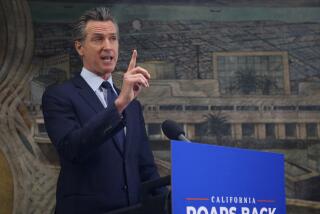Slick Sales Pitch on Car Tax
- Share via
Would you be suspicious if a used car salesman tried to sell you a 1991 Chevrolet by insisting it really was a 1997 Cadillac? Of course. Yet Gov. Pete Wilson and his fellow Republicans are using a comparable ruse in touting a drastic reduction or elimination of the state’s $4-billion vehicle license fee.
Wilson and Co. are trying to puff up the car tax as the next California tax revolt. But this is no Proposition 13. No one heard more than a murmur of discontent about the car tax until Assemblyman Tom McClintock (R-Northridge) called for elimination of the annual 2% fee in January, after a Republican rode to the governorship of Virginia on the car tax issue.
Then Wilson expropriated the idea, proposing a cut of 75% for a total cost of $3.6 billion a year--money that now goes to local government. But Legislative Analyst Elizabeth Hill says the tax cut could plunge the state budget back into red ink as early as 1999-2000 and the deficit could surpass $3 billion within four years.
Here are the proponents’ arguments and why they are misleading:
* The vehicle fee is California’s most outrageous tax, much like the property tax back in 1978.
The fee averages $185 per vehicle, but is less than $50 for the oldest 5 million cars. The fee declines annually, while the property tax on homes was soaring dramatically in 1978.
* The tax was increased in 1991 to help the state through hard times. It’s only fair now to return the money to the taxpayers.
The fee was raised by about $900 million annually in 1991, not the $3.6 billion or $4 billion that the GOP wants to cut.
* Local government will not lose out because the state will guarantee alternative funds.
This promise can be decidedly ephemeral, subject to change by majority vote in the Legislature or by amendment in any future budget. Local governments still are holding the bag for about $1 billion a year in property taxes the state took during the recession.
A potential compromise beginning to make the rounds in Sacramento would reduce the fee by about $900 million, the size of the 1991 increase. This would meet the fairness test and still leave enough for other state priorities.
A tax cut in an election year certainly has appeal. But the job of the governor and Legislature is to balance priorities and choose among urgent needs, not yield to the temptation of a political plum. California needs Chevrolet practicality, not Cadillac dreams.






